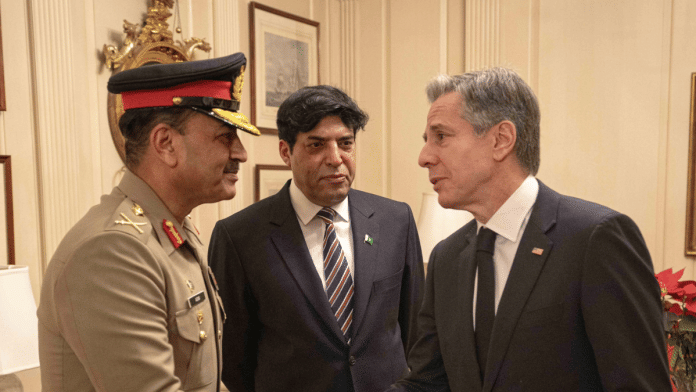New Delhi: In his first official visit to the US as Pakistan Army Chief, General Asim Munir met top US officials, including US Secretary of State Antony J. Blinken and Secretary of Defence General Llyod J. Austin.
The visit comes ahead of Pakistan’s general elections slated for February next year, amid a severe economic crisis in the country, and days after the Supreme Court of India upheld the government’s decision to scrap the special status of Jammu and Kashmir through abrogation of Article 370 of the Constitution.
The Kashmir issue and challenges posed by the Pakistani Taliban — or the Tehrik-e Taliban Pakistan (TTP) — are likely to have dominated discussions between Washington and Rawalpindi.
“Afghanistan and Kashmir will be the hot topics. General Asim Munir is likely to have asked US officials to take notice of the Indian Supreme Court’s verdict on Article 370 which he thinks is a violation of international law,” senior Pakistan-based journalist Hamid Mir told ThePrint.
According to the media wing of the Pakistan armed forces, Munir met Blinken and Austin, besides Under Secretary of State Victoria Nuland, Chairman of Joint Chiefs of Staff General Charles Q. Brown and Deputy National Security Adviser Jonathan Finer.
“During the meetings with defence officials, counter-terrorism cooperation and defence collaboration were identified as core areas of cooperation,” read a statement issued by the Inter Services Public Relations Pakistan (ISPR).
“COAS (Chief of the Army Staff) especially highlighted the importance of resolving the Kashmir issue in accordance with international law and relevant UNSC resolutions,” it added.
Earlier this week, India rejected a statement from the Organization of Islamic Cooperation (OIC) which criticised the Supreme Court’s decision to uphold Parliament’s discretion to abrogate Article 370.
In what appeared to be a veiled attack against Pakistan, New Delhi alleged that the OIC’s statement was issued at the “behest of a serial violator of human rights and an unrepentant promoter of cross-border terrorism”.
Also Read: China-backed Pakistan formally applies for BRICS membership, India silent for now
‘American arms in TTP hands’
Since the Taliban takeover in August 2021, the TTP has proved to be a renewed security challenge for Pakistan. A UN report last year flatly stated that of all the foreign extremist groups in Afghanistan, the TTP “benefitted the most” from the takeover.
Just this week, a Pakistani security forces’ post in Khyber-Pakhtunkhwa’s Dera Ismail Khan district was hit by a terror attack on 12 December. The Tehreek-e-Jihad Pakistan (TJP), an affiliate of the TTP, took responsibility for the attack which killed at least 23 Pakistani soldiers.
US Secretary of State Blinken had condemned the attack, saying: “We stand with the people of Pakistan in ensuring perpetrators are brought to justice and offer our deep condolences to the families of the victims.”
The United States strongly condemns the terrorist attack at a security post in Kyhber Paktunkhwa. We stand with the people of Pakistan in ensuring perpetrators are brought to justice and offer our deep condolences to the families of the victims.
— Secretary Antony Blinken (@SecBlinken) December 13, 2023
Earlier this year, the TTP was engaged in peace talks with the Pakistan government, led by PM Shehbaz Sharif, but those fell to the wayside. On the contrary, the TTP has forged closer ties with the Afghan Taliban, especially the Haqqani camp.
This June, a report by the United Nations Security Council monitoring team stated the TTP is launching attacks in Pakistan with help from the Taliban leadership in Kabul.
Further, reports have emerged that American arms left behind in Afghanistan after the US withdrawal, have been obtained by Pakistan-based armed groups including the TTP. These have added to the lethality of such groups, say experts quoted by US-backed broadcasting service Radio Free Europe/Radio Liberty.
This is likely to have been discussed by the Pakistan army chief and US officials.
According to former Indian high commissioner to Pakistan, Ajay Bisaria, the larger geopolitical takeaway from this visit is that it is perhaps an attempt by Pakistan to assure Washington that it is not completely aligned with China.
“The Pakistan army is keen not to give the US the impression that they are fully in the Chinese camp, particularly in the context of (former Pakistan PM) Imran Khan’s allegations about (US State Department official) Donald Lu and the leaked FO note saying Pakistan’s strategic interest lay in hitching its wagon to China,” Bisaria told ThePrint.
Earlier this year, ousted Pakistan PM Imran Khan had claimed that Lu was allegedly involved in a conspiracy to overthrow his government through a no-confidence vote.
This May, leaked US intelligence documents revealed that then-Pakistan Minister of State for Foreign Affairs Hina Rabbani Khar had cautioned the country against sacrificing its strategic relationship with China to maintain ties with the US.
“Pakistan feels US support is critical on the economic front, in unlocking IMF funds, in getting relief in the FATF and also for F16 spares and so on,” Bisaria explained.
The former envoy also made the distinction that while the White House and US State Department may have “gone cold” on Pakistan after the US withdrawal from Afghanistan, the Pentagon continues to advocate a strong relationship with Rawalpindi.
Ahead of Munir’s visit, the US Defence Department’s press secretary Major General Patrick Ryder had in a briefing said Pakistan continues to be an “important partner” for the US in the region, especially on issues like “counter-terrorism”.
(Edited by Amrtansh Arora)
Also Read: India calling itself Bharat fulfills Pakistan’s age-old wish






